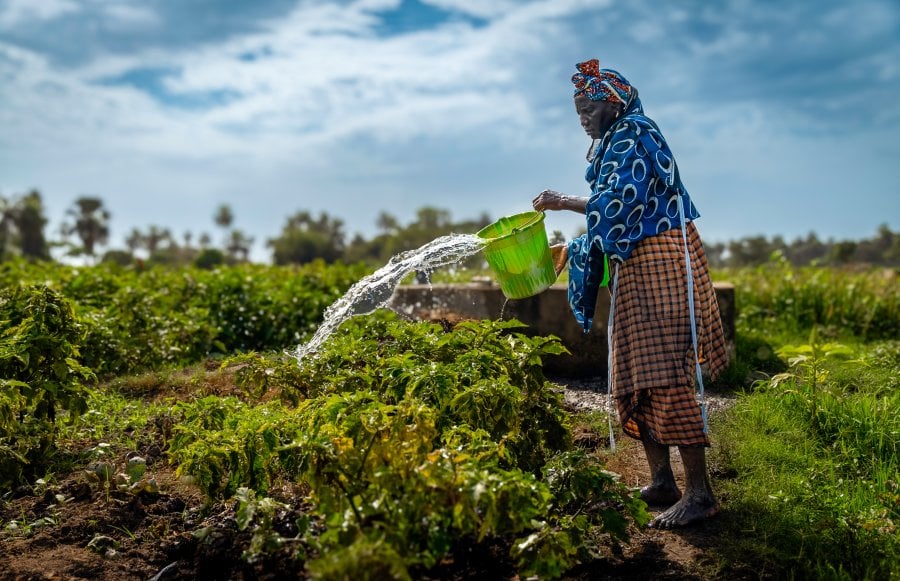
A Woman watering crops
Health has (finally) made its way onto the agenda at this year’s COP28, with the first ever ‘Health Day’. Our experts from the Planetary Health Cross Cutting Theme at The Medical Research Council Unit The Gambia at The London School of Hygiene and Tropical Medicine (MRCG at LSHTM) share their thoughts on this year’s COP.
Dr Ana Bonell is an Assistant Professor at the London School of Hygiene and Tropical Medicine (LSHTM) based at MRCG at LSHTM. As COP28 draws to an end she stated “There is a fair amount of controversy surrounding COP this year including record numbers of fossil fuel lobbyists attending.” In commenting on her field of research and its place at the summit, she added “Planetary Health has done an excellent job of highlighting the fact that human health is dependent on the healthy and functioning environmental and planetary systems. Research studies have clearly demonstrated that there is a clear risk to human health should we continue on our current emission and environmental degradation trajectory.”
Despite the questions raised on if the needed transformative changes and commitments will indeed be agreed upon, she looked at her role as a researcher and concluded “COP can be an opportunity to reach a wider and less scientific audience and hopefully inspire action, but let’s wait and see .”
The first-ever ‘Health Day’ took place at COP28 this year. Dr Zakari Ali is a Research Fellow working on Climate and Health at MRCG at LSHTM. In commenting on the Health Day he stated “I am excited that health is beginning to take centre stage on climate change discussions.” He cautioned however “We need to make sure this is not a one-off show at only COP28 but get real commitments and more discussion on health and climate change in subsequent COPs.”
In looking at the overall achievements thus far, Dr Ali commended certain commitments that have been made “We have seen further funding commitments announced to support vulnerable populations in low-income settings. One billion USD has been announced at COP28 in financial support for climate and health. The UAE has further committed 200 million USD to support resilience in low-income settings. These are significant achievements at this year’s COP which will support the much-needed adaptation and mitigation efforts in climate prone but vulnerable populations.”
While welcoming these commitments, he highlighted the work that still needs to be done in the field of Planetary Health “We need more association research and studies that link climate change to health and quantify their many implications using local data. This will further arm our governments and negotiators to make the right demands for action at national and global stages such as COP and the UNGA.”
Dr Kris Murray is Co-Director of the Centre on Climate Change and Planetary Health at LSHTM and Programme Lead for Planetary Health at MRCG at LSHTM. He brought the COP28 together with research at LSHTM and MRCG at LSHTM stating:
“Our work at MRCG at LSHTM is somewhat a microcosm of the broader work of the Centre on Climate Change and Planetary Health. The Centre is of strategic importance not only for health in the 21st Century but also of the School itself as global change has become a truly global health challenge.”
He continued “The work of the Planetary Health group at MRCG focusses on three primary areas in which we are generating the scientific evidence base and informing policy on: the direct and indirect impacts of climate change on health, sustainable food systems, and infectious disease ecology. Our aim is to increase the ambition of sustainability action and decision-making in the Gambia, West Africa and beyond through the lens of human health.”
In looking back at what has happened at COP28 Dr Murray highlighted “There are still some major barriers to the results we need to meet the Paris Agreement. Where decent progress was made on some elements of fundraising, particularly for vulnerable populations in low and middle-income countries, the question of how global climate finance will ultimately lead to and benefit adaptation action remains open. And we are perilously close to losing concrete commitment on fossil fuel phase out, which is probably the most important outcome this year’s COP could have delivered.”
He concluded “Without effective connections with policy and policymakers, research and evidence on the links between global change and health has limited capacity to engage and catalyse genuine change.”
If you enjoyed this article and would like to build a career in global health, we offer a range of MSc programmes covering health and data, infectious and tropical diseases, population health, and public health and policy.
Available on campus or online, including flexible study that works around your work and home life, be part of a global community at the UK's no.1 public health university.
